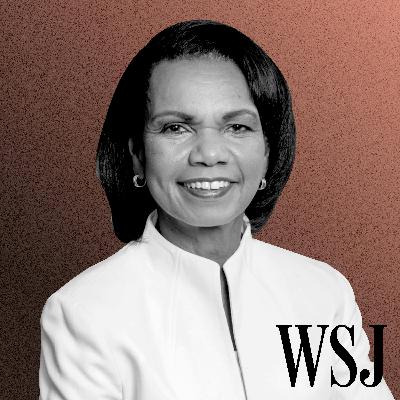Discover Bold Names
Bold Names

Bold Names
Author: The Wall Street Journal
Subscribed: 113,456Played: 940,707Subscribe
Share
Copyright © Dow Jones & Company, Inc. All rights reserved.
Description
WSJ’s Bold Names brings you conversations with the leaders of the bold-named companies featured in the pages of The Wall Street Journal. Hosts Tim Higgins and Christopher Mims speak to CEOs and business leaders in interviews that challenge conventional wisdom and take you inside the decisions being made in the C-suite and beyond.
239 Episodes
Reverse
Is "buy now, pay later" a debt trap or the future of finance? Affirm CEO Max Levchin says the real problem is the credit card in your wallet. On this week’s episode of Bold Names, Levchin joins WSJ’s Tim Higgins to discuss how his early days as a co-founder of PayPal led him to his latest venture: using “buy now, pay later” loans to reinvent how people buy things. We talk about why he thinks financing is more transparent than credit, the personal reason he hates late fees and how AI is changing shopping.
To watch the video version of this episode, visit our WSJ Podcasts YouTube channel or the video page of WSJ.com.
Check Out Past Episodes:
The Boldest Ideas of 2025 — And What’s in Store for 2026
Inside Visa’s Tech-Charged Future: From Crypto to AI
This CEO Says Global Trade Is Broken. What Comes Next?
Why Bilt’s CEO Wants You To Pay Your Mortgage With a Credit Card
Let us know what you think of the show. Email us at BoldNames@wsj.com.
Sign up for the WSJ's free Technology newsletter.
Read Christopher Mims’s Keywords column.
Read Tim Higgins’s column.
Learn more about your ad choices. Visit megaphone.fm/adchoices
Bold Names is gearing up to be bigger and bolder than ever in 2026. Get ready for another year of the best minds in business and tech going deep on the latest industry moves. From the C-suite of tech companies like SAP, Qualcomm and Affirm, to leaders from Lamborghini, Southwest Airlines and Chobani, WSJ’s Christopher Mims and Tim Higgins will be back next week to kick off a new year of conversations with the leaders shaping tomorrow.
To watch the video version of this episode, visit our WSJ Podcasts YouTube channel or the video page of WSJ.com.
Check Out Past Episodes:
The Boldest Ideas of 2025 — And What’s in Store for 2026
McLaren CEO Zak Brown On F1 And Business Strategy At 200 Miles Per Hour
This Tech Founder's $1.3 Billion Company Is Taking On Apple and Samsung
This CEO Says Global Trade Is Broken. What Comes Next?
Let us know what you think of the show. Email us at BoldNames@wsj.com.
Sign up for the WSJ's free Technology newsletter.
Read Christopher Mims’s Keywords column.Read Tim Higgins’s column.
Learn more about your ad choices. Visit megaphone.fm/adchoices
Who will take care of you in old age? Jeff Cardenas, the CEO and co-founder of Apptronik, says the answer is robots. The startup founder set out to build a smart, dexterous robot after watching his grandfathers grow old and dependent in their later years. Beyond healthcare, Cardenas sees robots as essential to U.S. economic growth and national security with applications across industries. Even with the latest advances in artificial intelligence and hardware, what will it take for humanoid robots to make the leap from science fiction to reality? On the latest episode of the Bold Names podcast, Cardenas tells WSJ’s Christopher Mims and Tim Higgins why Apptronik is betting it will create the home robot helper that everyone will want.
To watch the video version of this episode, visit our WSJ Podcasts YouTube channel or the video page of WSJ.com.
Check Out Past Episodes:
Condoleezza Rice on Beating China in the Tech Race: 'Run Hard and Run Fast'
Reid Hoffman Says AI Isn’t an ‘Arms Race,’ but America Needs to Win
Why This Investor Says the AI Boom Isn’t the Next Dot-Com Crash
How the U.S. Stacks Up to China’s ‘Engineering State’
Let us know what you think of the show. Email us at BoldNames@wsj.com.
Sign up for the WSJ's free Technology newsletter.
Read Christopher Mims’s Keywords column.Read Tim Higgins’s column.
Learn more about your ad choices. Visit megaphone.fm/adchoices
As a special bonus, we’re bringing you an episode of WSJ’s Take On the Week. Co-host Telis Demos and guest host WSJ Chief Economics Correspondent Nick Timiraos are joined by Beth Hammack, president of the Federal Reserve Bank of Cleveland, to discuss the state of the U.S economy, interest rates and the central bank itself.
Hammack shares her views on what she’s hearing from businesses in her district and what that could mean for consumer prices and the labor market. She emphasizes the importance of Fed independence and the chairman’s role in fusing differing viewpoints to create stable monetary policy. She also offers her perspective on the so-called neutral rate as well as artificial intelligence.
If you like what you hear, subscribe to WSJ’s Take On the Week for weekly market previews and analysis.
Visit our WSJ Podcasts YouTube channel or the video page of WSJ.com.
Check Out Past Episodes:
Inside Visa’s Tech-Charged Future: From Crypto to AI
Why This Investor Says the AI Boom Isn’t the Next Dot-Com Crash
This CEO Says Global Trade Is Broken. What Comes Next?
Further Reading:
Cleveland Fed’s Beth Hammack Skeptical of Further Cuts
Let us know what you think of the show. Email us at BoldNames@wsj.com.
Sign up for the WSJ's free Technology newsletter.
Read Christopher Mims’s Keywords column.Read Tim Higgins’s column.
Learn more about your ad choices. Visit megaphone.fm/adchoices
In this special episode, Tim Higgins and Christopher Mims revisit some of their favorite moments from the first year of Bold Names. We look back on conversations with guests including Microsoft AI CEO Mustafa Suleyman and former Secretary of State Condoleezza Rice on the explosive growth of AI and the complexities of the U.S.-China trade war. Then, Mims and Higgins flip the script to interview each other about the technological breakthroughs and geopolitical shifts that defined 2025 — and ask if the AI industry is heading toward a bubble burst next year. Plus, we answer your questions.
To watch the video version of this episode, visit our WSJ Podcasts YouTube channel or the video page of WSJ.com.
Check Out Past Episodes:
How Microsoft’s AI Chief Defines ‘Humanist Super Intelligence’
This CEO Says Global Trade Is Broken. What Comes Next?
Condoleezza Rice on Beating China in the Tech Race: 'Run Hard and Run Fast
Why IBM's CEO Thinks His Company Can Crack Quantum Computing
Let us know what you think of the show. Email us at BoldNames@wsj.com.
Sign up for the WSJ's free Technology newsletter.
Read Christopher Mims’s Keywords column.
Read Tim Higgins’s column.
Learn more about your ad choices. Visit megaphone.fm/adchoices
Gaming is a $200 billion industry that dwarfs Hollywood — and PlayStation is at the center of it all. On this week’s episode of Bold Names, Sony Interactive Entertainment SVP Eric Lempel joins WSJ’s Christopher Mims and Tim Higgins to discuss how the company plans to compete in a mobile-first gaming world. We talk about keeping the “soul” of game development as artificial intelligence becomes more integrated into businesses, the success of games like “Fortnite” and “The Last of Us,” and what the next decade holds for the console wars.
To watch the video version of this episode, visit our WSJ Podcasts YouTube channel or the video page of WSJ.com.
Check Out Past Episodes:This Tech Founder's $1.3 Billion Company Is Taking On Apple and Samsung
Why This Investor Says the AI Boom Isn’t the Next Dot-Com Crash
The Google-Backed Startup Taking on Elon Musk in Humanoid Robotics
Let us know what you think of the show. Email us at BoldNames@wsj.com.
Sign up for the WSJ's free Technology newsletter.
Read Christopher Mims’s Keywords column.
Read Tim Higgins’s column.
Learn more about your ad choices. Visit megaphone.fm/adchoices
What business lessons are forged at 200 miles per hour? On this week’s Bold Names, McLaren Racing CEO Zak Brown joins Christopher Mims and Tim Higgins to talk about his new book, “Seven Tenths of a Second.” A racecar driver turned executive, Brown leads a global racing organization worth hundreds of millions of dollars. We talk about the pressure and focus required to run a winning Formula One team, and what racing has taught Brown about leading a competitive business.
To watch the video version of this episode, visit our WSJ Podcasts YouTube channel or the video page of WSJ.com.
Check Out Past Episodes:
How Uber Plans to Win the Self-Driving Car Race
70,000 Bets a Minute: How FanDuel’s Parent Is Winning at Sports Gambling
How Tubi Is Coming for Netflix and YouTube in the New Streaming Wars
Space Trucks: One Startup’s Plan to Get the U.S. Back on the Moon
Let us know what you think of the show. Email us at BoldNames@wsj.com.
Sign up for the WSJ's free Technology newsletter.
Read Christopher Mims’s Keywords column.Read Tim Higgins’s column.
Learn more about your ad choices. Visit megaphone.fm/adchoices
This week, we’re bringing you an episode of The Journal, produced by Spotify and the Wall Street Journal. In this episode, recorded at WSJ’s Tech Live, host Jessica Mendoza sits down with Michael Kratsios, Director of the White House Office of Science and Technology Policy, to discuss everything from chips to chatbots, how Kratsios thinks AI should be regulated, and whether or not the AI boom might be a bubble.
To watch the video version of this episode, visit our WSJ Podcasts YouTube channel or the video page of WSJ.com.
Check Out Past Episodes:
Condoleezza Rice on Beating China in the Tech Race: 'Run Hard and Run Fast'
Reid Hoffman Says AI Isn’t an ‘Arms Race,’ but America Needs to Win
Why This Investor Says the AI Boom Isn’t the Next Dot-Com Crash
How the U.S. Stacks Up to China’s ‘Engineering State’
Let us know what you think of the show. Email us at BoldNames@wsj.com.
Sign up for the WSJ's free Technology newsletter.
Read Christopher Mims’s Keywords column.
Read Tim Higgins’s column.
Learn more about your ad choices. Visit megaphone.fm/adchoices
Are we becoming a nation mined for our money, data, and attention? Author and legal scholar Tim Wu certainly thinks so. A key architect of President Joe Biden’s antitrust policy, Wu joins WSJ’s Christopher Mims and Tim Higgins on Bold Names to explain how a handful of tech platforms conquered the economy and why he fears Silicon Valley could become “inefficient, bloated, and bested by foreign competitors,” if the country doesn’t rein in monopoly power. Wu shares insights from his new book, “The Age of Extraction,” which maps out a path toward restoring competition and rebuilding an economy that works for everyone.
To watch the video version of this episode, visit our WSJ Podcasts YouTube channel or the video page of WSJ.com.
Check Out Past Episodes:
The World’s Tech Giants Are Running Out of Power. This CEO Plans to Deliver.
Why This Investor Says the AI Boom Isn’t the Next Dot-Com Crash
Inside Visa’s Tech-Charged Future: From Crypto to AI
Condoleezza Rice on Beating China in the Tech Race: 'Run Hard and Run Fast
Let us know what you think of the show. Email us at BoldNames@wsj.com.
Sign up for the WSJ's free Technology newsletter.
Read Christopher Mims’s Keywords column.
Read Tim Higgins’s column.
Learn more about your ad choices. Visit megaphone.fm/adchoices
Electricity demand is exploding, fueled by the rise of artificial intelligence and an unprecedented wave of data center construction. Some experts warn the U.S. grid won’t be able to handle it. But Scott Strazik, the CEO of GE Vernova, says his company can deliver. On this episode of Bold Names, Strazik joins the WSJ’s Christopher Mims and Tim Higgins to talk about leading GE’s energy spin-off through its blockbuster first year, how gas turbines have become Silicon Valley’s hottest commodity, and whether nuclear can help power the future.
To watch the video version of this episode, visit our WSJ Podcasts YouTube channel or the video page of WSJ.com.
Check Out Past Episodes:
Condoleezza Rice on Beating China in the Tech Race: 'Run Hard and Run Fast'
The Google-Backed Startup Taking on Elon Musk in Humanoid Robotics
This Tech Founder's $1.3 Billion Company Is Taking On Apple and Samsung
Let us know what you think of the show. Email us at BoldNames@wsj.com.
Sign up for the WSJ's free Technology newsletter.
Read Christopher Mims’s Keywords column.Read Tim Higgins’s column.
Learn more about your ad choices. Visit megaphone.fm/adchoices
Driverless cars are no longer in the realm of science fiction. Nearly a decade after abandoning its own self-driving car unit, Uber is taking a hybrid approach, partnering with more than a dozen autonomous vehicle firms, including Alphabet’s Waymo and Chinese robotaxi company WeRide. But as the robotaxi market heats up, can Uber stay in the race? On the latest episode of Bold Names, Uber’s Chief Product Officer, Sachin Kansal, speaks to WSJ’s Christopher Mims and Tim Higgins about the company's plans for a driverless future.
To watch the video version of this episode, visit our WSJ Podcasts YouTube channel or the video page of WSJ.com.
Check Out Past Episodes:
Inside Visa’s Tech-Charged Future: From Crypto to AI
This Tech Founder's $1.3 Billion Company Is Taking On Apple and Samsung
The Google Exec Reinventing Search in the AI Era
Condoleezza Rice on Beating China in the Tech Race: 'Run Hard and Run Fast
Let us know what you think of the show. Email us at BoldNames@wsj.com.
Sign up for the WSJ's free Technology newsletter.
Read Christopher Mims’s Keywords column.
Read Tim Higgins’s column.
Learn more about your ad choices. Visit megaphone.fm/adchoices
Every second, tens of thousands of transactions cross Visa’s global network. Last year alone, the company processed more than $13 trillion in purchases – nearly triple the size of Japan’s economy. Now, one of the largest payment networks in the world wants to become even bigger. On this episode of Bold Names, Rajat Taneja, Visa’s president of technology, joins WSJ’s Christopher Mims and Tim Higgins to discuss how the company is embracing digital currency and agentic AI to power the future of payments. Taneja says this is a natural evolution for a company built on innovation. But what does the future hold? Will Visa be the next everything platform?
To watch the video version of this episode, visit our WSJ Podcasts YouTube channel or the video page of WSJ.com.
Check Out Past Episodes:
This Tech Founder's $1.3 Billion Company Is Taking On Apple and Samsung
Condoleezza Rice on Beating China in the Tech Race: 'Run Hard and Run Fast'
The Google-Backed Startup Taking on Elon Musk in Humanoid Robotics
Why IBM's CEO Thinks His Company Can Crack Quantum Computing
Let us know what you think of the show. Email us at BoldNames@wsj.com
Sign up for the WSJ's free Technology newsletter.
Read Christopher Mims’s Keywords column.
Read Tim Higgins’s column.
Learn more about your ad choices. Visit megaphone.fm/adchoices
Can a startup beat Apple and Samsung on their own turf? Carl Pei, the founder and CEO of Nothing, is betting on it. Growing up in Sweden, Pei was captivated by American gadgets like Apple’s first iPod. But over time, he says, those products lost their edge. On the latest episode of Bold Names, Pei joins WSJ’s Christopher Mims and Tim Higgins to explain why he believes his electronics company, Nothing, which is valued at $1.3 billion, can challenge Apple and Samsung. Pei believes that artificial intelligence and a new generation of design-savvy users will set Nothing apart.
To watch the video version of this episode, visit our WSJ Podcasts YouTube channel or the video page of WSJ.com.
Check Out Past Episodes:
Reid Hoffman Says AI Isn’t an ‘Arms Race,’ but America Needs to Win
The Google Exec Reinventing Search in the AI Era
Why This Tesla Pioneer Says the Cheap EV Market 'Sucks'
Let us know what you think of the show. Email us at BoldNames@wsj.com
Sign up for the WSJ's free Technology newsletter.
Read Christopher Mims’s Keywords column.
Read Tim Higgins’s column.
Learn more about your ad choices. Visit megaphone.fm/adchoices
The artificial intelligence boom has sparked one of the costliest building sprees in history. By 2028, investment in chips, servers and data centers could hit nearly $3 trillion, according to Morgan Stanley. To help fund the build-out, tech companies are taking on huge amounts of debt, raising concerns of a possible bubble. On the latest episode of the Bold Names podcast, Martin Casado, a general partner at Andreessen Horowitz, who leads the firm’s $1.25 billion infrastructure practice, speaks to WSJ’s Christopher Mims and Tim Higgins, about whether the industry’s biggest bet in decades will deliver returns. Casado explains why he is optimistic about AI and how this moment compares to the internet buildout of the 1990s.
To watch the video version of this episode, visit our WSJ Podcasts YouTube channel or the video page of WSJ.com.
Check Out Past Episodes:
The Google Exec Reinventing Search in the AI Era
Condoleezza Rice on Beating China in the Tech Race: 'Run Hard and Run Fast'
Why IBM's CEO Thinks His Company Can Crack Quantum Computing
How Tubi Is Coming for Netflix and YouTube in the New Streaming Wars
Let us know what you think of the show. Email us at BoldNames@wsj.com
Sign up for the WSJ's free Technology newsletter.
Read Christopher Mims’s Keywords column.
Read Tim Higgins’s column.
Learn more about your ad choices. Visit megaphone.fm/adchoices
Every day, billions of searches flow through Google, making it not just the world’s most popular search engine, but one of history’s most valuable products. Yet for the first time in nearly 30 years, the company’s dominance is under threat. Generative artificial intelligence tools like Open AI’s ChatGPT and Perplexity are changing how people find information. On the latest episode of the Bold Names podcast, Liz Reid, VP, head of Google Search, speaks to WSJ’s Christopher Mims and Tim Higgins about transforming search for the age of AI. After more than two decades inside the company, Reid says that Google has weathered disruption before and believes this moment will expand, not erode, how people explore the web. But can Google Search survive in a world of AI chatbots and answer engines?
To watch the video version of this episode, visit our WSJ Podcasts YouTube channel or the video page of WSJ.com.
Check Out Past Episodes:
Condoleezza Rice on Beating China in the Tech Race: 'Run Hard and Run Fast'
The Google-Backed Startup Taking on Elon Musk in Humanoid Robotics
Reid Hoffman Says AI Isn’t an ‘Arms Race,’ but America Needs to Win
Why IBM's CEO Thinks His Company Can Crack Quantum Computing
Let us know what you think of the show. Email us at BoldNames@wsj.com
Sign up for the WSJ's free Technology newsletter.
Read Christopher Mims’s Keywords column.
Read Tim Higgins’s column.
Learn more about your ad choices. Visit megaphone.fm/adchoices
Condoleezza Rice’s experience navigating geopolitical tensions and uncertainty gives her a background few people have. The former secretary of state currently leads the Hoover Institution at Stanford University and is a founding partner at Rice, Hadley, Gates & Manuel LLC, a strategic consulting firm. On this week’s episode of Bold Names, she speaks to WSJ’s Christopher Mims and Tim Higgins about why she says the U.S. needs to “run hard and run fast” and win the tech race with China. She also explains why executives can no longer afford to think of foreign policy as separate from strategy.
To watch the video version of this episode, visit our WSJ Podcasts YouTube channel or the video page of WSJ.com.
Check Out Past Episodes:
This CEO Says Global Trade Is Broken. What Comes Next?
What This Former USAID Head Had to Say About Elon Musk and DOGE
‘Businesses Don’t Like Uncertainty’: How Cisco Is Navigating AI and Trump 2.0
Why This Tesla Pioneer Says the Cheap EV Market 'Sucks'
Let us know what you think of the show. Email us at BoldNames@wsj.com.
Sign up for the WSJ's free Technology newsletter.
Read Christopher Mims’s Keywords column.Read Tim Higgins’s column.
Learn more about your ad choices. Visit megaphone.fm/adchoices
Who will take care of you in old age? Jeff Cardenas, the CEO and co-founder of Apptronik, says the answer is robots. The startup founder set out to build a smart, dexterous robot after watching his grandfathers grow old and dependent in their later years. Beyond healthcare, Cardenas sees robots as essential to U.S. economic growth and national security with applications across industries. Even with the latest advances in artificial intelligence and hardware, what will it take for humanoid robots to make the leap from science fiction to reality? On the latest episode of the Bold Names podcast, Cardenas tells WSJ’s Christopher Mims and Tim Higgins why Apptronik is betting it will create the home robot helper that everyone will want.
Check Out Past Episodes:
Why IBM's CEO Thinks His Company Can Crack Quantum Computing
‘Businesses Don’t Like Uncertainty’: How Cisco Is Navigating AI and Trump 2.0
Humanoid Robot Startups Are Hot. This AI Expert Cuts Through the Hype.
Reid Hoffman Says AI Isn’t an ‘Arms Race,’ but America Needs to Win
Let us know what you think of the show. Email us at BoldNames@wsj.com.
Sign up for the WSJ's free Technology newsletter.
Read Christopher Mims’s Keywords column.
Read Tim Higgins’s column.
Learn more about your ad choices. Visit megaphone.fm/adchoices
The relationship between the U.S. and China is typically framed as competitive and even adversarial. Each superpower brings strengths and weaknesses to how it approaches its society, business and growth. In his new book "Breakneck: China's Quest to Engineer the Future," author and China expert Dan Wang, frames the key differences between the two superpowers. He argues that China can be understood as an "engineering state" that builds at breakneck speed regardless of public opinion or dissent. He says the U.S., on the other hand, is a "lawyerly society" that offers civil and environmental protections, but blocks everything, good and bad. On the latest episode of the Bold Names podcast, Wang speaks to WSJ’s Christopher Mims about how this framework could help us understand which country ultimately has the upper hand in the current geopolitical and technological arms race.
To watch the video version of this episode, visit our WSJ Podcasts YouTube channel or the video page of WSJ.com.
Check Out Past Episodes:
This CEO Says Global Trade Is Broken. What Comes Next?
What This Former USAID Head Had to Say About Elon Musk and DOGE
‘Businesses Don’t Like Uncertainty’: How Cisco Is Navigating AI and Trump 2.0
Why This Tesla Pioneer Says the Cheap EV Market 'Sucks'
Let us know what you think of the show. Email us at BoldNames@wsj.com.
Sign up for the WSJ's free Technology newsletter.
Read Christopher Mims’s Keywords column.
Read Tim Higgins’s column.
Learn more about your ad choices. Visit megaphone.fm/adchoices
After spending much of the 2010s in the doldrums, IBM has made something of a comeback in the past five years under the leadership of CEO Arvind Krishna. That's thanks to a lot of the success in its hybrid cloud business, as well as its consulting services. All of this has led to a surge in the company's share price. Now, IBM is betting that quantum computing will be the next big thing. But will Big Blue succeed against rivals like Microsoft and Google who are racing to make their own quantum breakthroughs? And how is the company learning from its past mistakes with Watson AI? Arvind Krishna speaks to WSJ’s Christopher Mims and Tim Higgins on the latest episode of the Bold Names podcast.
To watch the video version of this episode, visit our WSJ Podcasts YouTube channel or the video page of WSJ.com.
Check Out Past Episodes:
This CEO Says Global Trade Is Broken. What Comes Next?
What This Former USAID Head Had to Say About Elon Musk and DOGE
‘Businesses Don’t Like Uncertainty’: How Cisco Is Navigating AI and Trump 2.0
Why This Tesla Pioneer Says the Cheap EV Market 'Sucks'
Let us know what you think of the show. Email us at BoldNames@wsj.com
Sign up for the WSJ's free Technology newsletter.
Read Christopher Mims’s Keywords column.
Read Tim Higgins’s column.
Learn more about your ad choices. Visit megaphone.fm/adchoices
Every day, Wall Street Journal journalists talk with the most powerful, influential and interesting people. WSJ columnists Christopher Mims and Tim Higgins are bringing some of those conversations directly to you. Bold Names returns with new episodes on Fridays starting September 12 on YouTube and wherever you get your podcasts.
Let us know what you think of the show. Email us at BoldNames@wsj.com
Sign up for the WSJ's free Technology newsletter.
Read Christopher Mims’s Keywords column.
Read Tim Higgins’s column.
Learn more about your ad choices. Visit megaphone.fm/adchoices























$100 Registration Bonus Eksklusibo sa jet!
Maging Miyembro ng daddy at Makatanggap ng $100 Agad!
Magsimula sa fresh: Makakuha ng $100 Welcome Bonus!
Magsimula sa fresh: Makakuha ng $100 Welcome Bonus!
sherbet Registration Bonus: Libreng $100 Para sa Mga Bagong User!
Magparehistro sa supernova at Makakuha ng $100 Bonus Kaagad!
Magparehistro sa supernova at Makakuha ng $100 Bonus Kaagad!
Sumali sa jazz Ngayon at Kumuha ng $100 Welcome Bonus!
Sumali sa jazz Ngayon at Kumuha ng $100 Welcome Bonus!
Simulan ang Iyong Paglalaro sa 500 casino na may Libreng $100 Bonus!
$100 Bonus Agad Para sa Mga Bagong User ng highway!
Bagong User? Sumali sa sol at Makatanggap ng $100 Bonus!
Makakuha ng $100 Bonus Kapag Nagparehistro sa exclusive Ngayon!
Para sacar na token casino - https://casinoonline-br.com/token-casino/, você precisa fornecer dados bancários e uma foto de um documento de identidade para validação. O processo de saque é rápido e seguro, e a plataforma garante que todas as suas transações financeiras sejam protegidas por tecnologia de criptografia.
Ao solicitar um saque na 777luc bet - https://casinoonline-br.com/777luc-bet/, você precisará enviar dados bancários, além de uma cópia do seu documento de identidade. A plataforma é altamente segura e garante que todos os fundos sejam protegidos, utilizando criptografia para prevenir qualquer tipo de fraude ou roubo de dados.
A br89 bet - https://casinoonline-br.com/br89-bet/ garante a segurança dos seus saques exigindo que os usuários enviem dados como informações bancárias e um documento com foto. Todos os dados são protegidos por criptografia avançada, assegurando que seus fundos sejam transferidos de maneira rápida e sem riscos.
Na hora de sacar seus ganhos na dc casino - https://casinoonline-br.com/dc-casino/, será necessário enviar alguns dados como número da sua conta bancária e um documento oficial. A plataforma adota altos padrões de segurança para garantir que suas informações financeiras e pessoais estejam sempre protegidas.
Para retirar dinheiro na t89 bet - https://casinoonline-br.com/t89-bet/, você precisa fornecer dados como informações bancárias e um documento de identificação. A plataforma utiliza criptografia de alto nível para proteger suas transações e garantir que seus fundos sejam transferidos de forma rápida e sem riscos.
Se você deseja sacar seus ganhos na apk pix bet - https://casinoonline-br.com/apk-pix-bet/, será necessário enviar dados como informações bancárias ou de carteira digital e um documento oficial com foto. A plataforma garante a segurança das suas transações financeiras, utilizando sistemas de proteção de dados que asseguram rapidez e segurança.
Ao realizar um saque na 31bet - https://casinoonline-br.com/31bet/, o usuário deve fornecer dados como número da conta bancária ou dados de e-wallet e um documento de identidade. A plataforma se destaca pela segurança das transações, usando tecnologia de criptografia para proteger seus dados financeiros e pessoais.